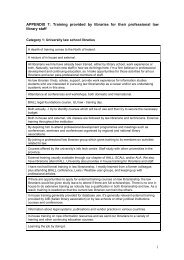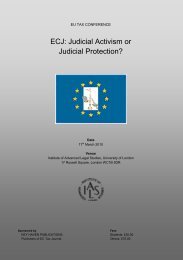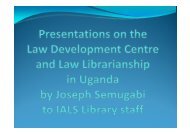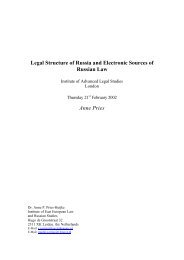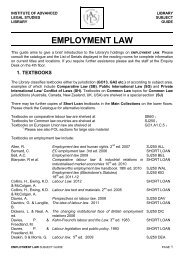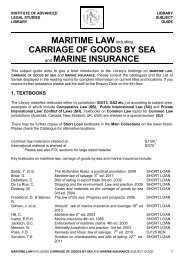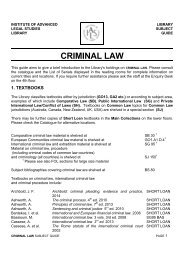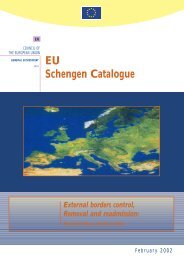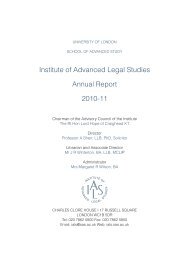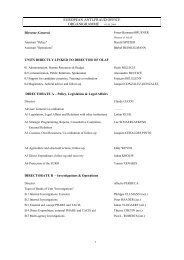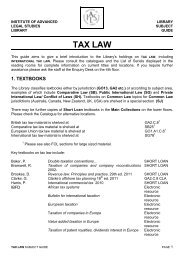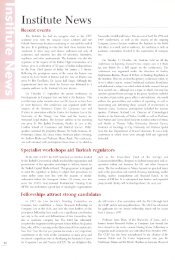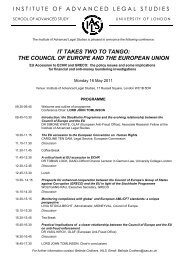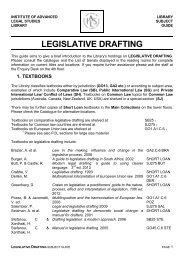a thesis - Institute of Advanced Legal Studies
a thesis - Institute of Advanced Legal Studies
a thesis - Institute of Advanced Legal Studies
You also want an ePaper? Increase the reach of your titles
YUMPU automatically turns print PDFs into web optimized ePapers that Google loves.
42 EXPRESS TRUSTS.<br />
(1858), 25 Beav. 469; In re Cnplin's Will (1865), 2 Dr. & Sm.<br />
527 ; Wilson v. Dugnid (1883), 24 Oh. D. 244.)<br />
But there must be a clear indication by the donor that he<br />
intended the power to be regarded as a trust. (In re Weekcs'<br />
Settlement, (1897) 1 Ch. 289.)<br />
The rule applies to a power <strong>of</strong> appointment in favour <strong>of</strong> an<br />
individual. (Ticeedak v. Tweedak (1878), 7 Ch. D. 633.) But it<br />
does not apply if there is a gift over in default <strong>of</strong> appointment<br />
(Richardson v. Richardson (1885), 16 Q,. B. D. 85), even though the<br />
gift over in default is void. (Miky v. Cape (1880), W. N. 151.)<br />
The following cases illustrate the application <strong>of</strong> this principle:—<br />
Illustrations.<br />
1. A. by will gives property to his wife, desiring her at or<br />
before her death to give the same " unto and amongst such <strong>of</strong> his<br />
own relations as she should think most deserving and approve <strong>of</strong>."<br />
This creates a trust in favour <strong>of</strong> A.'s next <strong>of</strong> kin. Harding v.<br />
Glyn (1739), 1 Atk. 469.<br />
[Note.—Having regard to the modern view <strong>of</strong> precatory trusts,<br />
probably this case cannot now be relied on.]<br />
2. A. by will directs that certain property, in case his two<br />
children shall both die without leaving lawful issue, shall be disposed<br />
<strong>of</strong> as after mentioned, that is to say, the survivor <strong>of</strong> his two<br />
children shall have power to dispose by will <strong>of</strong> the property<br />
" amongst my nephews and nieces, or their children, either all to<br />
one <strong>of</strong> them or to as many <strong>of</strong> them as his surviving child shall<br />
think proper." This creates a trust in favour <strong>of</strong> the class, subject<br />
to a power <strong>of</strong> selection and distribution in A.'s surviving child.<br />
But-rough v. Philcox (1840), 5 My. & Or. 73.<br />
3. A. by his will, after giving a fund to his wife for life, directs<br />
that after her death it shall be paid to such and so many <strong>of</strong> the<br />
" relations or friends " <strong>of</strong> the wife as she shall by will appoint.<br />
This creates a trust in favour <strong>of</strong> the wife's next <strong>of</strong> kin. In re<br />
Caplin's Will (1865), 2 Dr. & Sm. 527.<br />
4. A. gives his trustees power, if his daughter marries with<br />
their consent, to appoint part <strong>of</strong> her fortune on her death to her



